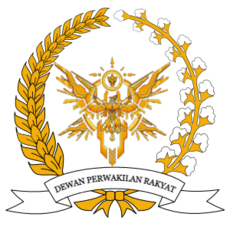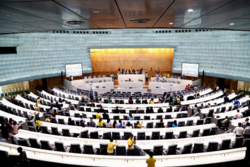People's Representative Council
This article is incomplete because it is pending further input from participants, or it is a work-in-progress by one author. Please comment on this article's talk page to share your input, comments and questions. Note: To contribute to this article, you may need to seek help from the author(s) of this page. |
People's Representative Council Dewan Perwakilan Rakyat Kerajaan Prawasia | |
|---|---|
 | |
| Type | |
| Type | |
Term limits | None |
| Leadership | |
Speaker | Prof. Dr. Johan Mansyur (PNP) since 1 June 2020 |
First Deputy Speaker | Gatra Prayoga (PAB) since 1 June 2020 |
Second Deputy Speaker | Pangestu Alam Syahnur (GPS) since 1 June 2020 |
Third Deputy Speaker | Elvin Wibisono (PKP) since 1 June 2020 |
| Structure | |
| Seats | 500 |
 | |
Political groups | Government
PNP: 130 seats PAB: 82 seats GPS: 78 seats PKP: 59 seats PPP: 55 seats PDP: 14 seats
Opposition PSR: 34 seats PBP: 20 seats CHB: 18 seats
Unaligned PSP: 10 seats
|
| Authority | Passing laws and budgets (together with the Prime Minister); oversight on the executive branch |
| Elections | |
| Party-list proportional representation | |
Last election | January 2020 |
Next election | January 2025 |
| Meeting place | |
 | |
| Majelis Nasional Manyar, Prawasia | |
| Website | |
| www | |
The People's Representative Council of the Kingdom of Prawasia is one of the two elected national legislative assemblies in Prawasia. Together with the State Representative Council (Dewan Perwakilan Negara, DPN), a second chamber with limited powers, it makes up a legislative body, the National Assembly (Majelis Nasional). For 2020 elections, there would be 500 members, all elected.
Powers
The DPR has three main functions: legislative, budgeting and oversight. It draws up and passes laws of its own as well discussing and approving government regulations in lieu of law and proposals from the State Representative Council (DPN) related to regional issues. Together with the Prime Minister, it produces the annual budget, taking into consideration the views of the DPN. It also has the right to question the Prime Minister and other government officials.